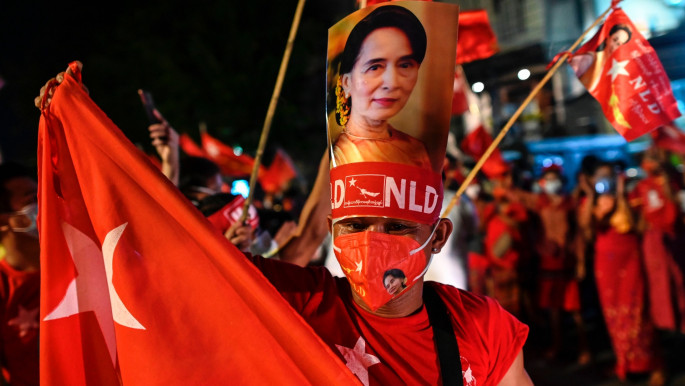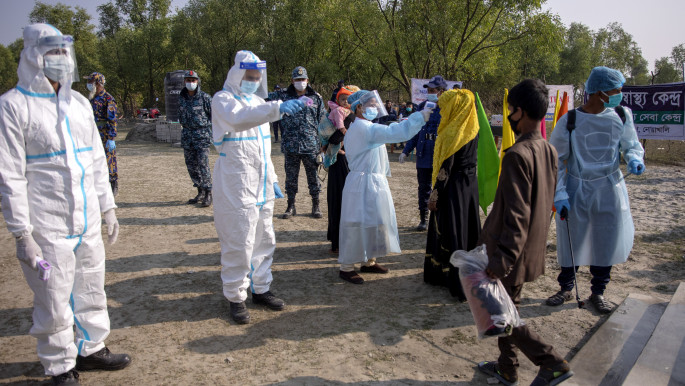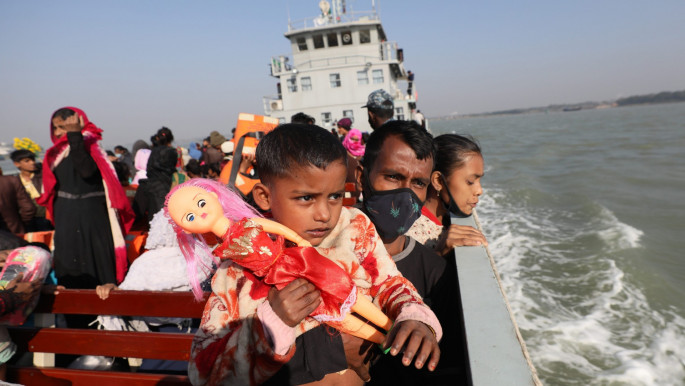Bhasan Char: Everything is not what it seems at this new Rohingya refugee island
But in the same vein, it is claimed that insufficient healthcare is jeopardising the wellbeing of the island's new inhabitants. Furthermore, a lack of female doctors is also causing anxiety amongst Rohingya women, indicating all may not be what it seems beyond the shiny new facade of the silt-formed isle.
Sources on the ground have told The New Arab how availability of medical treatment and facilities in Cox's Bazaar outweigh those on the island; and that the Bangladesh government will not provide full access to such resources until it has relocated 100,000 people from Kutupalong camp.
But this has created a life or death scenario for the likes of Fazia* who said she lost her husband to heart failure because he did not get proper medical attention on the island.
She said medication prescribed to her husband by doctors on the mainland was not accessible on the island and this lack had a detrimental impact on his wellbeing.
In a voice message, she told The New Arab: "My husband was a heart patient and he was very weak. When we were at the mainland, he received proper treatment from hospitals where doctors prescribed a saline to boost his energy. But when we got to the island, I ran everywhere trying to find this, but it was not available."
 |
When we were at the mainland, he received proper treatment from hospitals where doctors prescribed a saline to boost his energy. But when we got to the island, I ran everywhere trying to find this, but it was not available |  |
She said doctors discharged her husband from hospital when he was in "a critical condition" and that soon after, "he died at home."
 |
|
| Read also: The Rohingya crisis and Myanmar's dark road to democracy |
Sources on the ground have confirmed there are two main hospitals in Bhasan Char: a government-NGO facility [known as RTM International], and a Navy-operated one.
Witness statements and video/photographic evidence of medical prescriptions and injuries seen by The New Arab indicate how others are also affected by this lack of medical attention on Bhasan Char.
Among them, a seven-year-old girl who broke her leg last summer after tripping over a broken electric pole near the camp where she once lived on the mainland.
In a video sent to The New Arab, the girl described how "bits of broken bone and pus" have been leaking from her injury.
In the video, her mother also spoke of her exasperation: "My daughter is in pain day and night and the injections given to her by doctors in Bhasan Char have not helped at all. The injury is too painful to touch and I fear it is rotting. But the doctors do not even examine it properly. Instead, the medicines they have given are making her weak."
In a separate video, also seen by The New Arab, another woman said she was given "gastric tablets" to treat a burn injury caused by hot water spillage. Another said antacid tablets prescribed for a swollen leg were not helping. She said food and hygiene products are not properly distributed either.
"I am still waiting 10 days for soap. They should take us back to main camp if they cannot provide such basics, otherwise we will jump into the sea."
Amira*, a single mother who lost her husband when he drowned escaping Myanmar in 2008, said she is also among those who have experienced insufficient medical care on the island.
She told The New Arab: "Two years after my husband's death, I lost my father to chronic diabetes. I went into a deep depression and this had a severe impact on my mental health."
Amira said she left Myanmar in 2017 to make the perilous journey to Bangladesh, but shortly after arriving, also lost her mother.
She said as a single mother left to fend for herself, resettling in Bhasan Char was the only immediate option left. "I was eager to see the new place. I felt it would be safer and more comfortable than Kutupalong, where we also lived in fear of the yaba gangs."
 |
I was eager to see the new place. I felt it would be safer and more comfortable than Kutupalong, where we also lived in fear of the yaba gangs |  |
Yaba gangs are groups of smugglers from Myanmar known for transporting 'yaba' pills, an illegal substance comprising a mix of methamphetamine and caffeine.
Relieved to escape the intensity of such an environment, Amira said she and her daughter were each given 5,000Tk on the boat to Bhasan Char.
She added: "The army personnel on the boat treated us with great hospitality and this made me very happy.
"When we disembarked, the first thing I saw were Rohingya who had arrived before us. They were having a lot of fun and they welcomed us too. After a great reception, we were offered delicious food, snacks and apples."
 |
|
| A general view of the housing complex of Bhasan Char island [Getty] |
 |
|
| Officials wearing protective suits check the body temperature of Rohingya refugees after arriving in Bhasan Char [Getty] |
She said the army carried out temperature checks on each person, and they were then shown "a nice place to sit in comfortable chairs." She said this gave her the confidence Bhasan Char "would be a good place for us to live."
"Later on, we were taken by bus to a large dining area. It was a wonderful place. I saw many roofs with red paint and new buildings. They each had four to five floors. I love those beautiful buildings and terraces."
 |
|
| Read also: Out of sight, out of mind: Who will protect Rohingyas sent to remote, flood-prone island? |
Amira said she also liked the "cleanliness and hygiene of Bhasan Char," particularly after living in "cramped, dirty conditions in Kutupalung" where it was difficult to "sit, stand or walk" in the tiny shelters, where they also lived in fear of landslides.
But she said there is more to the island than meets the eye: "The doctors and nurses here do not provide proper medical treatment, nor do the take time to listen to patients and communicate with them properly. We are not given the chance to explain our problems."
She said facilities for taking x-rays, blood tests and other check-ups are also missing, affecting in particular, those with high blood pressure, diabetes, jaundice, TB and other ongoing health issues and diseases. However, she said those in need of emergency care get transported by helicopter to the state hospital on the mainland.
 |
There are hardly any female doctors here. As women, we are embarrassed to explain our sensitive female health issues to the male doctors |  |
"There are hardly any female doctors here. As women, we are embarrassed to explain our sensitive female health issues to the male doctors."
But she said the one female medic she did speak with referred her to a male doctor.
"I did not want to tell him I had pain in my breasts. I felt so ashamed. So the woman doctor explained to him for me. I was given five antacids tablets and five ibuprofen.
"I tried to tell him this will not work but he replied with aggression. The pills did not work and I am still in pain."
Despite such challenges of life on the island, Amira said her daughter is happy she can at least go to school for the first time since leaving Myanmar some three years ago.
"My daughter is very happy because school was not possible in Kutupalong camp."
At the same time, Amira said she misses the villagers, friends, relatives and NGO colleagues she left behind at the mainland.
"We shared feelings of happiness and sadness with each other. I miss our talks about repatriation to Myanmar, and about situations in the camp."
But she said her greatest concern now is to educate her daughter, who "plans to be a doctor so she can care for me when she is older."
Bhasan Char may be more "comfortable" than the mainland. But for some of those on the ground, it is nothing more than a deceptive facade making survival a life or death situation, at least until sufficient medical care becomes more accessible.
The New Arab has contacted RTM International and the Bangladesh Ministry of Health and Family Welfare for comment.
*Names of people in this story have been changed





 Follow the Middle East's top stories in English at The New Arab on Google News
Follow the Middle East's top stories in English at The New Arab on Google News


